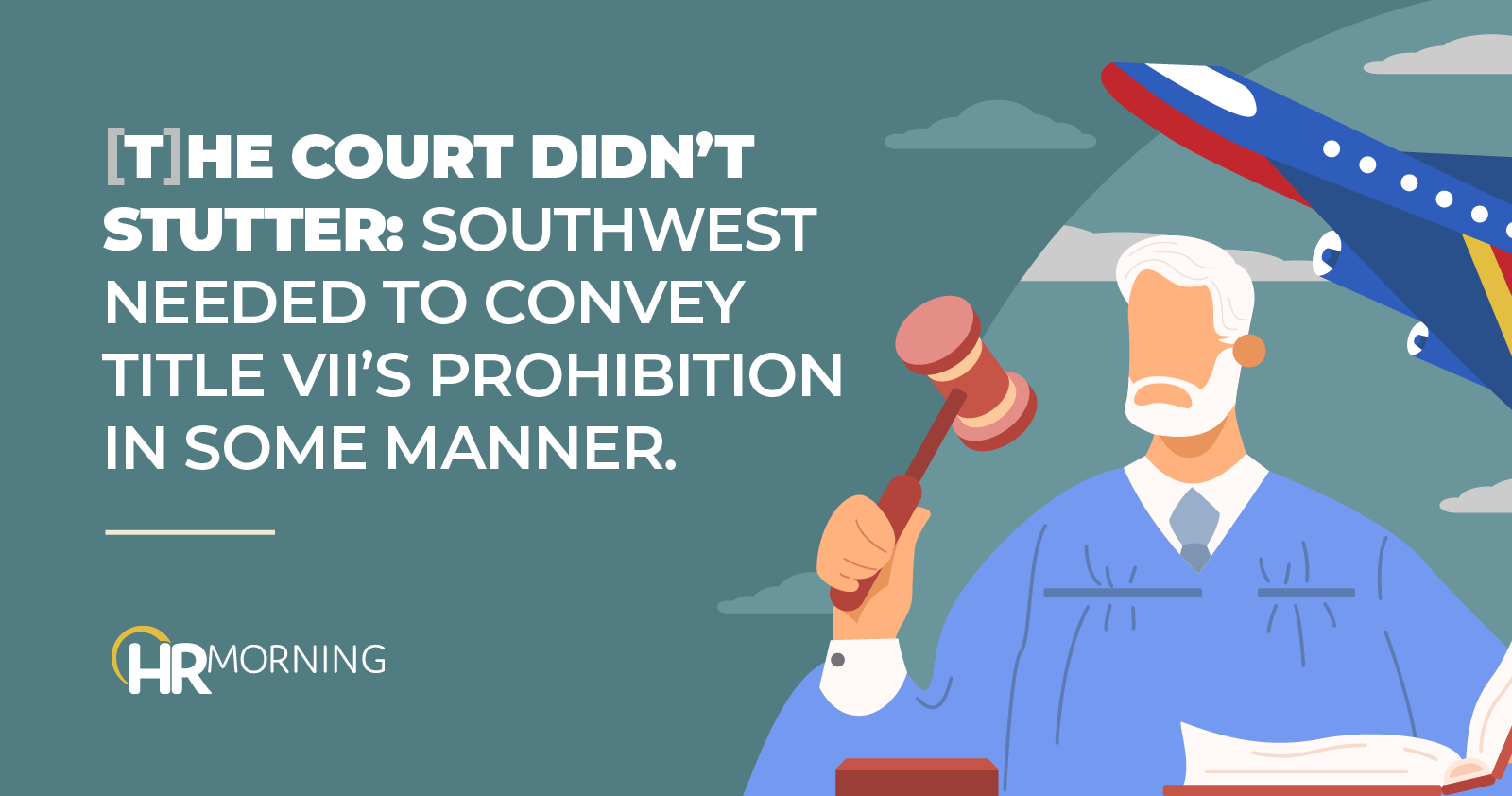Wanna get away? Judge slams Southwest in scathing decision

Just how quickly can things go from bad to worse if a company decides to ignore a court order?
(Spoiler – pretty darn fast. Remember that Baltimore company we told you about last month?)
And earlier this week, a federal court in Texas issued a scathing decision that should drive the message home: As a general rule, judges don’t take kindly to being ignored.
Fired Southwest flight attendant claims discrimination, retaliation
This dispute started back in 2017. We covered the original case, but here’s a quick recap and update:
A flight attendant filed a Title VII religious discrimination and retaliation lawsuit against Southwest and the union. Her suit claimed she was fired for criticizing the union’s decision to use fees and dues to help pay for union members to attend the Women’s March in Washington, D.C., which was sponsored by Planned Parenthood.
The jury heard testimony about Facebook messages, abortion videos, collective bargaining agreements and much more. Ultimately, the jury sided with the employee, ordering the airline to pay $4.15 million and the union to pay $1.15 million.
On appeal, the award was reduced to $800,000. The court also ordered Southwest to reinstate the fired flight attendant and notify the rest of its flight attendants that Title VII forbids the airline from discriminating against them for their “religious practices and beliefs.”
Were court orders followed?
But according to the flight attendant, the airline didn’t follow the court’s instructions. She filed a motion for sanctions with regard to the required notice.
As injunctive relief, the court had ordered the airline to notify its flight attendants that, under Title VII, the company “may not discriminate” against flight attendants for their religious beliefs.
However, the airline’s notice stated: The court “ordered us to inform you that Southwest does not discriminate against our Employees for their religious practices and beliefs.”
In the court’s view, this message “communicated that there’s nothing to see here—aside from the Court’s bequeathing Southwest a badge of honor for not discriminating (which the Court did not do).”
But that wasn’t the only problem.
The airline also “sent a memo to its flight attendants the same day, stating that its employees must abide by the types of policies over which Southwest fired [the flight attendant] and that it believed its firing of [the employee] was justified because of those policies,” the court explained.
Court delivers blistering commentary, sanctions
The court was clearly not happy with the notice. Perhaps since the issue stemmed from a religious dispute, the court used a biblical analogy to make its point:
After God told Adam, “[Y]ou must not eat from the tree [in the middle of the garden],” imagine Adam telling God, “I do not eat from the tree in the middle of the garden”—while an apple core rests at his feet.
Here are a few more noteworthy quotes that showcase the court’s displeasure:
- “In the universe we live – the one where words mean something – Southwest’s notice didn’t come close to complying with the Court’s order.”
- “The Court ordered Southwest to convey a legal prohibition, and Southwest didn’t do that. Southwest’s revisionist interpretation comes up short.”
- “[T]he Court didn’t stutter: Southwest needed to convey Title VII’s prohibition in some manner.”
- “Southwest’s disregard of the Court’s order was willful.”
- “Southwest stymied Title VII’s policies with [the flight attendant] and continues to do so now.”
The court granted the flight attendant’s motion, held the airline in contempt, and considered appropriate sanctions to “compel compliance with its order[.]”
First, the court ordered the airline to pay the flight attendant’s attorneys’ fees.
Next, it provided an appropriate statement of notice and ordered the airline to provide it “verbatim to its flight attendants to set the record straight[.]”
Attorneys for the airline lodged a complaint about this sanction, arguing that a “particular statement” would violate the company’s First Amendment right against compelled speech.
The court was not swayed by this argument – nor was it amused.
“When a litigant ‘does not appear to comprehend’ a legal concept, training in ‘the relevant subject area’ constitutes a particularly apropos sanction,” the court explained.
In light of the continued arguments, the court determined Southwest’s in-house counsel was “at the root of the problem.”
It issued a third sanction, ordering the airline to send the three attorneys to an eight-hour religious liberty training conducted by the Alliance Defending Freedom (ADF), which has to be completed by Aug. 28.
In sum, the court issued three sanctions, ordering Southwest to:
- Pay the flight attendant’s attorneys’ fees associated with this action
- Deliver the verbatim notice to its flight attendants, and
- Send its in-house attorneys to ADF’s religious liberty training.
Southwest plans to appeal.
Carter v. Transport Workers Union of America, Local 556 and Southwest Airlines Co., No. 3:17-CV-2278-X (N.D. Tex. 8/7/23).

